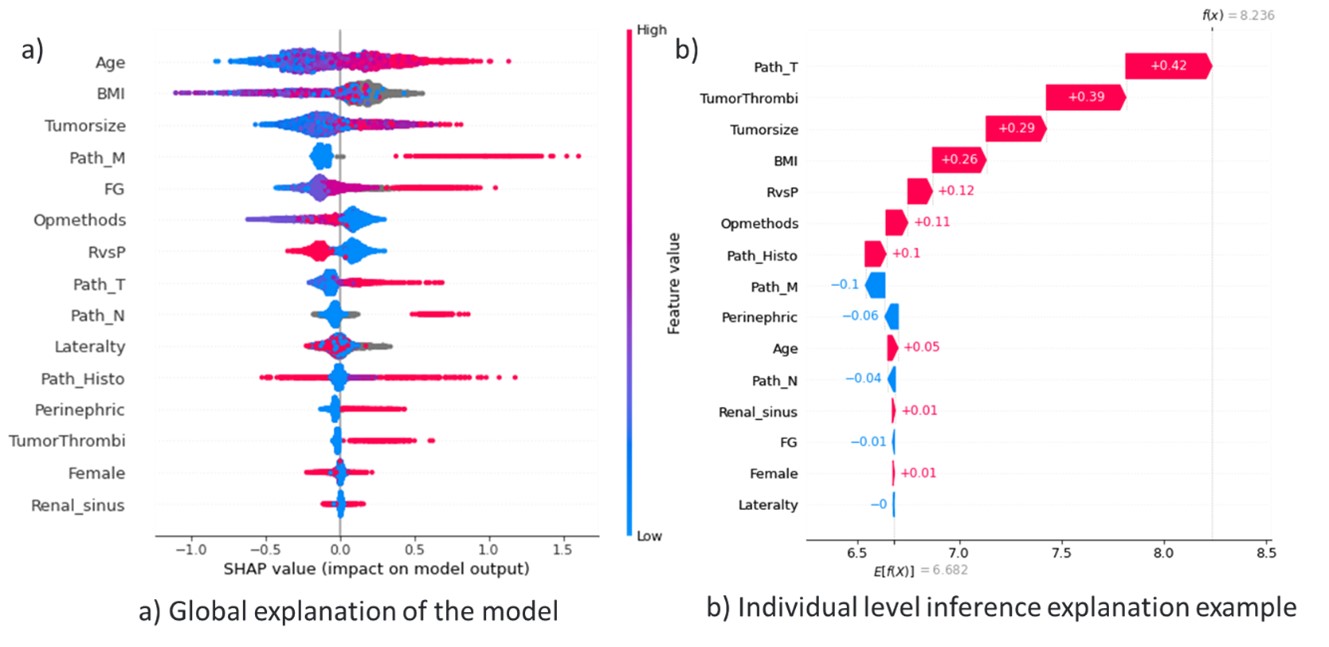Back
Poster, Podium & Video Sessions
Moderated Poster
MP47: Kidney Cancer: Epidemiology & Evaluation/Staging/Surveillance III
MP47-01: Development of individual level inference available explainable artificial intelligence model for cancer-specific survival after nephrectomy in renal cell carcinoma patients
Sunday, May 15, 2022
2:45 PM – 4:00 PM
Location: Room 228
Jungyo Suh*, Dongwon Kim, Bumjin Lim, Cheryn Song, Dalsan You, In Gab Jeong, Jun Hyuk Hong, Bumsik Hong, Hanjong Ahn, Choung-Soo Kim, Seoul, Korea, Republic of
- JS
Jungyo Suh, MD
Seoul National University
Poster Presenter(s)
Introduction: This study aim to development individual level inference available explainable artificial intelligence (XAI) model for the cancer specific survival (CSS) prediction for renal cell carcinoma patient who underwent nephrectomy.
Methods: A single centre, nephrectomy registry data from 1990 to 2016 were retrospectively reviewed for this analysis. Clinical parameters (age, sex, body mass index), surgical parameter (operation methods) and pathologic feature (histologic type, T stage, N stage, M stage, tumor thrombus, Fuhrman Grade) were included for analysis. Train/valid and test set was split with 8:1:1 ratio. Accelerated failure time (AFT) model for CSS was developed by decision tree-based ensemble machine learning method. Hyperparameters of the model were optimized by Bayesian method. Concordance index(c-index) was evaluated for accuracy of the estimated survival time of the developed model. Global and individual level inference were simulated and displayed by shapely additive value
Results: From 4969 nephrectomy patients, 4688 were eligible for analysis. Average age was 54.8±12.2 year-old and average survival time was 47.7±38.8 months. After hyperparameter optimization, the c-index of the final developed model was 0.932, 0.849 and 0.832 for each of train, validation, and test dataset.
Conclusions: We successfully developed XAI model with acceptable level performance for the cancer specific survival prediction for renal cell carcinoma patient.
Source of Funding: None.

Methods: A single centre, nephrectomy registry data from 1990 to 2016 were retrospectively reviewed for this analysis. Clinical parameters (age, sex, body mass index), surgical parameter (operation methods) and pathologic feature (histologic type, T stage, N stage, M stage, tumor thrombus, Fuhrman Grade) were included for analysis. Train/valid and test set was split with 8:1:1 ratio. Accelerated failure time (AFT) model for CSS was developed by decision tree-based ensemble machine learning method. Hyperparameters of the model were optimized by Bayesian method. Concordance index(c-index) was evaluated for accuracy of the estimated survival time of the developed model. Global and individual level inference were simulated and displayed by shapely additive value
Results: From 4969 nephrectomy patients, 4688 were eligible for analysis. Average age was 54.8±12.2 year-old and average survival time was 47.7±38.8 months. After hyperparameter optimization, the c-index of the final developed model was 0.932, 0.849 and 0.832 for each of train, validation, and test dataset.
Conclusions: We successfully developed XAI model with acceptable level performance for the cancer specific survival prediction for renal cell carcinoma patient.
Source of Funding: None.


.jpg)
.jpg)